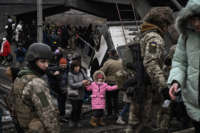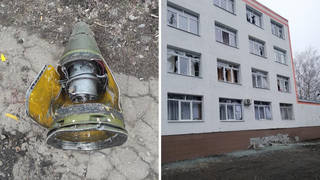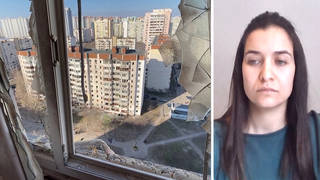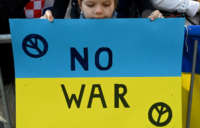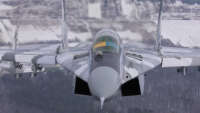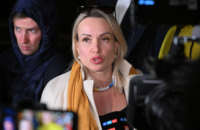
The United Nations is warning Russia’s invasion of Ukraine could lead to a “hurricane of hunger and a meltdown of the global food system” that would be especially devastating for the Global South. Wheat and fertilizer prices have soared since the war began three weeks ago. Global food prices could jump by as much as 22% this year as Russia’s invasion of Ukraine disrupts exports from two of the world’s largest producers of wheat and fertilizer. Rising fuel prices will also contribute to higher food prices. To talk more about how Russia’s war in Ukraine is leading to a global food crisis, we are joined by Raj Patel, author of Stuffed and Starved and a research professor at the University of Texas at Austin, who explains how farmers and working-class people around the world will face the brunt of the impact of growing food prices. He notes the coronavirus, climate change, conflict and capitalism are working to compound one another and underscore the necessity to transition to sustainable, agroecological farming.
TRANSCRIPT
This is a rush transcript. Copy may not be in its final form.
AMY GOODMAN: This is Democracy Now!, democracynow.org, The War and Peace Report. I’m Amy Goodman.
The United Nations is warning Russia’s invasion of Ukraine could lead to a, quote, “hurricane of hunger and a meltdown of the global food system.” Wheat and fertilizer prices have soared since the war began three weeks ago. The U.N.’s Food and Agriculture Organization warns global food prices could jump by 22% this year, which will have a devastating impact on the Global South. Russia is the world’s largest wheat and fertilizer exporter. Ukraine is the world’s fifth-largest wheat exporter. The two countries are also major exporters of corn and barley. Rising food prices will also contribute to higher food prices. U.N. Secretary-General António Guterres addressed the crisis earlier this week. He said the breadbasket of the developing world is being bombed.
SECRETARY–GENERAL ANTÓNIO GUTERRES: While war rains over Ukraine, a sword of Damocles hangs over the global economy, especially in the developing world. Even before the conflict, developing countries were struggling to recover from the pandemic, with record inflation, rising interest rates and looming debt burdens. Their ability to respond has been erased by exponential increases in the cost of financing. Now their breadbasket is being bombed.
Russia and Ukraine represent more than half of the world’s supply of sunflower oil and about 30% of the world’s wheat. Ukraine alone provides more than half of the World Food Programme’s wheat supply. Food, fuel and fertilizer prices are skyrocketing. Supply chains are being disrupted. And the costs and delays of transportation of imported goods, when available, are at record levels.
All of this is hitting the poorest the hardest and planting the seeds for political instability and unrest around the globe. Grain prices have already exceeded those at the start of the Arab Spring and the food riots of 2007, 2008. The FAO’s global food prices index is at its highest level ever. Forty-five African and least developed countries import at least one-third of their wheat from Ukraine and Russia; 18 of those countries import at least 50%. This includes countries like Burkina Faso, Egypt, Democratic Republic of the Congo, Lebanon, Libya, Somalia, Sudan and Yemen. We must do everything possible to avert a hurricane of hunger and a meltdown of the global food system.
AMY GOODMAN: Those are the words of the U.N. Secretary-General António Guterres earlier this week.
To talk more about how Russia’s war in Ukraine is leading to a global food crisis, we’re joined by Raj Patel, research professor at the University of Texas, Austin, author of Stuffed and Starved: The Hidden Battle for the World Food System and co-director of the documentary The Ants and the Grasshopper, which focuses on agroecology, hunger and climate change. He also serves on the International Panel of Experts on Sustainable Food Systems.
So, Raj, together Ukraine and Russia provide something like a quarter of the world’s wheat. Can you talk about how Russia’s invasion of Ukraine is threatening the Global South?
RAJ PATEL: Well, you’re quite right, Amy. Between Russia and Ukraine, about 28% of the global wheat trade, measured by weight, comes from Russia and Ukraine. So, for some countries, like, for example, Eritrea — Eritrea imports 100% of its wheat from the combined sources of Russia and Ukraine. But it’s not just countries that import wheat directly from these countries that are feeling the impact, because, you know, what will happen is that with the absence of these stocks available, the global price in wheat will go up, and countries will try and source that wheat from other places. But what that means is that, globally, the price of wheat is going up and that the shocks of the Ukraine invasion get propagated everywhere. And that’s how you will be able to see an increase in hunger as a result of this.
The United Nations has been modeling that now the global number of people who are suffering undernutrition will hit possibly 830 million people. And that’s driven by price increases, as you mentioned before, of up to 22% in global wheat markets. So what’s happening is that once the supply becomes uncertain, global markets price in the uncertainty. You see wheat trading at incredibly high levels, hitting record levels earlier on this month. And that means that with high prices, you’re likely to see the kind of instability that the secretary-general was mentioning earlier on.
AMY GOODMAN: And talk about how the seasons work right now. I mean, we’re moving into, in just a few weeks, what would be planting season right in Ukraine and Russia.
RAJ PATEL: Right. And so, what we’re seeing at the moment is that farmers — I mean, you may have seen some footage of farmers trying to get into their fields and to access some of the wheat, some of the winter wheat, that’s been ready for harvest, and getting ready for spring planting. All of that becomes much less certain. And again, that uncertainty propagates worldwide because of the other commodity that is under threat here or that’s affected, and that’s fertilizer. As you mentioned in the introduction, Russia is the world’s largest nitrogen fertilizer exporter, and it is also a significant exporter of potash and phosphorus. All of these are things that industrial agriculture requires in order to be able to get the yields that we’re accustomed to.
With the price of all these fertilizers going up, it’s not just farmers in Ukraine who are suffering the impact. Globally, farmers who were dependent on these fertilizers are starting to make decisions about planting spring crops, for instance, in North America. And the supply response isn’t as robust as one might think. You know, it’s not as if farmers are heading off into the fields and deciding that they’re going to cover everything with wheat, in large part because it’s going to be expensive to fertilize that, and also in large part because we’re already seeing a drought in large parts of the Wheat Belt, spurred by climate change. And so, the sort of combination of the global network of international commodity prices driving up the prices everywhere mean that farmers are thinking twice about whether to vastly increase the number of acres they have under wheat production.
AMY GOODMAN: Thirty percent of Yemen’s wheat imports comes from Ukraine. Shortly after Russia’s invasion of Ukraine, many Yemenis rushed to buy flour and expressed concern about rising food prices. This is an example.
ALI AL-FAQIH: [translated] The Ukrainian-Russian war will affect the whole world and not just us. This war will affect import, export and trade, because we are an importer of wheat, and most of the foodstuffs are from abroad. So, undoubtedly, we will be affected. But we have great confidence in God that it will be resolved, God willing.
MAHRAN AL-QADHI: [translated] Everything is available, whether wheat or wheat flour, but we were surprised by the citizens’ demand because of the Ukraine war, although it had no effect. Our country has a war, and prices are fixed as we suffer from war. But the war between Russia and Ukraine caused people’s demand for wheat to increase so much that some traders raised their prices because of the great demand, although wheat flour is available and everything is available, whether wheat or wheat flour.
AMY GOODMAN: Food costs have already more than doubled in many areas of Yemen in the past year. According to the U.N., more than 17.4 million Yemenis are food insecure, 1.6 million in Yemen are expected to fall into emergency levels of hunger in coming months. Can you elaborate on this, Raj Patel?
RAJ PATEL: Well, I mean, again, what we’ve seen is that this conflict is happening after a dismal two years of the pandemic and a sort of dismal 10 years of recovery after the last global recession. So, all of this is sort of compounding one another. I mean, let’s start with, you know, if we’re thinking about the drivers of hunger internationally, you can sort of help — you can remember them by thinking of four Cs — most recently, of course, COVID, which has caused global increases in levels of hunger, not because COVID attacked cereals or that COVID in some way destroys food directly, but because COVID had a massive impact on the economies of countries around the world, particularly in the Global South. And while we in the United States were able to dodge the worst of it, with merely 40 million people in this country being food insecure — and somehow that’s considered acceptable — globally, the number of people who are food insecure is in excess of 2.3 billion. That’s a huge increase on the figures before the pandemic. So, COVID, by generating poverty, also generated hunger.
So, on top of COVID, you’ve got conflict. And again, the Ukraine is obviously a major conflict, but it’s not the only one. And the dynamics of conflict are invariably sort of similar, in that when conflict happens, farming is disrupted when the battlefield moves through rural areas, but it also has long-term implications for farmers not just in sort of destroying the land and the capacity to farm, but also through the human populations that move through the land. And all of that, again, drives up hunger.
The third thing, of course, to worry about is climate change. Again, you mentioned this at the top of the hour. Climate change is just getting worse. And, you know, there are large parts of the world where you see — you know, 10 years ago, we had a range of food rebellions, people taking to the streets because of the high price, in particular, of wheat. But 10 years ago, the high price of wheat was generated by a once-in-500-year climatic event in Russia, a heat wave that killed tens of thousands of people directly but then propagated these huge spikes in the price of wheat around the world. And right now we’re in the middle of many severe weather events. You know, in Mozambique, where 10 years ago there were these food rebellions, Mozambique is just recovering from a Category 3 cyclone, Cyclone Gombe, that passed through the area and has left vast amounts of devastation. So, climate change is making not just the farming of food much harder — you know, again, I mentioned the drought earlier on in the United States, but these extreme weather events are happening everywhere — but they’re also generating displacement and generating the destruction of stocks that, again, is driving hunger.
And so, the fourth C in global hunger, of course, is capitalism. The way that we grow food today is not with an ambition to make sure that everyone in the world is fed in a nutritious way. The reason to grow food is to make money. And as long as food is grown in order to generate profit rather than to end hunger, then we are structurally always going to have people who cannot afford that food. And tragically, as a result of the rise in prices, we are certain to see tens of millions more people fall into hunger, not just in Eritrea but throughout the Global South, particularly, actually, in Asia. The Asia-Pacific region is going to be much harder hit, just because of the levels of hunger that preexist there. But sub-Saharan Africa is going to have it pretty tough, too.
AMY GOODMAN: You know, António Guterres, the U.N. secretary-general, mentioned the Arab Spring in his speech warning how the invasion of Ukraine can lead to deepening hunger in the world. A sharp rise in the cost of wheat coincided in 2011 with the Arab Spring. Can you talk about that juxtaposition?
RAJ PATEL: So, the secretary-general actually mentioned two moments of high prices and low affordability of food. So, there was 2007, 2008 spike that saw protests in places like Haiti, for instance. And then, yes, in 2010, we saw the Arab Spring begin, triggered, in fact, by assaults on food vendors, and all of a sudden you saw massive movements of people taking to the streets at the end of 2010, beginning of 2011, driven in part by governments’ inability to be able to provide affordable food when people had come to expect that.
It would be reasonable to expect more protests this time around. But in the intervening years, what we’ve — we’ve not seen governments necessarily flock to the idea that what we need is grain storage. And particularly with interest rates rising, grain storage becomes increasingly expensive for countries. And instead, what we’re seeing is, globally, a sort of turn to nationalism in a way that casts the working class and casts the poorest off. And so, wherever you look, you find these sort of strongmen around the world, whether it’s Putin or Modi in India, for instance, presiding over catastrophic outcomes, particularly in hunger, because of COVID and because of their mismanagement of the economy. And instead of admitting that in fact what is needed is a redistribution of wealth and resources to the poorest, you see this national turn, where it becomes criminalized to criticize the government, it becomes treasonous to say that anything other than fighting for the flag is the right thing to do, and under cover of this sort of bourgeois patriotism, the working class are being sold out.
So, I would fully expect to see far more protests of people taking to the street. And it’s not a particular prophesy that I’m making here. We’ve already seen protests in countries that have defaulted on their debt under the pandemic. We’ve seen big protests in Sri Lanka, for instance. And I think it’s easy to see a moment in which the forces of nationalism are up against the forces and demands of working-class members of society, who are up against a fairly robust patriotic and militarized response. And I worry that we will see a return, as we did in 2010, of police forces opening fire on unarmed working-class people who are making a demand simply for their daily bread.
AMY GOODMAN: I mean, in Egypt, you have typically the world’s largest wheat importer buying more than 60% of its wheat abroad. Eighty percent of that is from Russia and Ukraine.
RAJ PATEL: And exactly. Although some of those shipments have managed to get through, the short-to-medium-term prognosis is not good. And because governments have failed to learn the lesson of the past two supply shocks, and because the international development agencies have generally not said, “Well, you know, the wise thing to do is for you to withdraw from the international trading system and make sure your domestic supply chains are robust,” we’re seeing — I worry with you, Amy, that we’re being set up to see many more protests, and without — you know, in the intervening 10 years, the left has been eroded — not eroded, but has been under assault so systematically that I worry that the outcome is going to be a sort of revival of a certain kind of nationalism that portends violence towards the working class rather than their liberation.
AMY GOODMAN: Let me ask you about here at home. The Financial Times has reported the U.S. Farm Service Agency is thinking about loosening federal restrictions on land. Can you explain what exactly that means and what the effects of this would be if it happens?
RAJ PATEL: Well, it’s a little too early to say. I mean, I was struck by this almost throwaway line in the Financial Times, where the Financial Times was investigating: Well, is the response to be able to plant more wheat here in the United States? And someone from the federal government was saying, “Well, we’re monitoring the situation very closely.” But what this might mean is that conservation easements can be violated and that more land can be put under planting.
But what I’m also seeing and hearing is that farmers are not in a position to be able to take full advantage of that, because, again, high fertilizer prices mean that, you know, if you start planting something, you’ll have to take care of the crop in order to be able to make it economical. But if fertilizer prices are high, that’s a problem. And then, again, because of climate change here in the United States, and because of drought in some of the grain baskets, and because of the sort of violence of industrial agriculture really draining aquifers, it’s not immediately clear that even if the federal government were to open up its lands to “plant, baby, plant” — in a sort of echo of 2008’s “drill, baby, drill” — it’s not clear that the supply response is going to be adequate. And even if farmers did do that, it would still be four months until spring wheat came in.
So, you know, in the short term, there’s very little relief that the United States is in a position to provide. But the worry, again, is that under cover of a certain kind of patriotism, there will be transfers of resources to certain kinds of stakeholders without a concomitant fall in the level of hunger globally or even here in the United States.
AMY GOODMAN: So, Raj Patel, we only have a minute, and I wanted to ask how the world food system can be changed to better be prepared for crises like these, failing, if it was at all possible, to prevent war from happening at all.
RAJ PATEL: Well, certainly, a transition towards more agroecological farming, I think, is wise for so many reasons. It increases our resilience to climate change. It shortens supply chains. It makes our food system more robust against extreme weather. It relocalizes the economy in a way that can support many more jobs and ensure that there is a return to a certain kind of commitment to making sure that everyone gets fed. And, of course, this will require a real commitment, not just a land reform, but to gender equality, because, again, hunger is a globally gendered phenomenon. And this will also require reparations from the Global North to the Global South for the damage we’ve caused these global agricultural systems to be so vulnerable in the first place. We have the solutions. But I think embracing the full sweep of a transformative agroecological shift in food systems is very doable. We have the policies. We know what to do. And what we have to do is fight for the political change to make that possible.
AMY GOODMAN: Raj Patel, we want to thank you for being with us, research professor at University of Texas, Austin, author of Stuffed and Starved: The Hidden Battle for the World Food System.
Coming up, we speak to Matthieu Aikins, author of the new book, The Naked Don’t Fear the Water: An Underground Journey with Afghan Refugees. Stay with us.

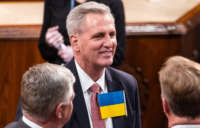
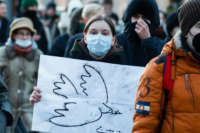
 Russia's biggest state-controlled bank is to be hit with sanctions within days as ministers ratchet up Britain’s economic response to the bloodshed in Ukraine
Russia's biggest state-controlled bank is to be hit with sanctions within days as ministers ratchet up Britain’s economic response to the bloodshed in Ukraine 

